What It Takes to Feed the Community in the Polar Bear Capital of the World
A sub-arctic research center in Churchill, Manitoba tackles food insecurity with vertical growing and incinerator composting.
What It Takes to Feed the Community in the Polar Bear Capital of the World
A sub-arctic research center in Churchill, Manitoba tackles food insecurity with vertical growing and incinerator composting.
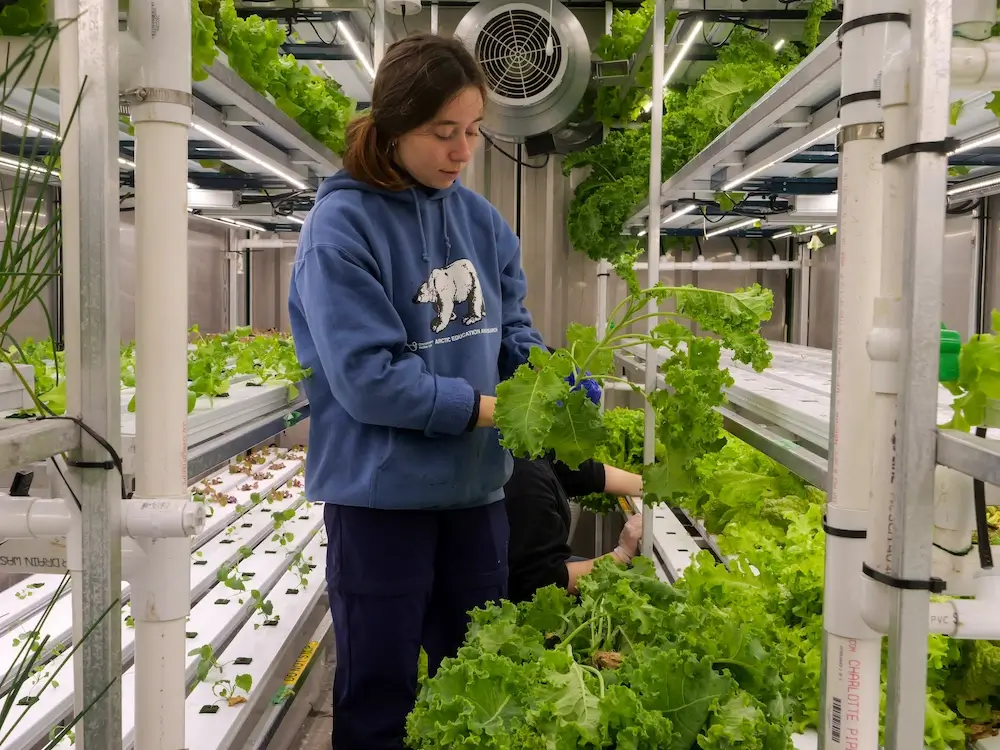
Katherine Branson harvests a crop of kale for the weekly subscription program.by Trina Moyles/Modern Farmer.
The sub-arctic community of Churchill, Manitoba, located on the western shores of the Hudson Bay, in northern Canada, often captures media attention for the way locals have learned to coexist with the largest land-based predator on the planet. When the ice on the bay thaws every spring, polar bears swim ashore and hunker down along the beaches outside of town until the fall when it freezes once again.
Locals take precautions, staying off the boulders where bears can doze out of sight, carrying deterrents like bear spray or marine flares and reporting sightings on the town’s Facebook page. Every Halloween, emergency services band together to patrol the perimeter of town for bears so kids can safely go trick-or-treating.
But there’s a much more pressing threat to community health than a 1,000-pound polar bear ambling through the streets of Churchill, one that doesn’t get the attention it deserves: food insecurity. Churchill, home to 900 residents year round, is accessible only by train and air, meaning that the cost of fresh produce is often double that which people would pay in the capital city of Winnipeg, located over 600 miles south.
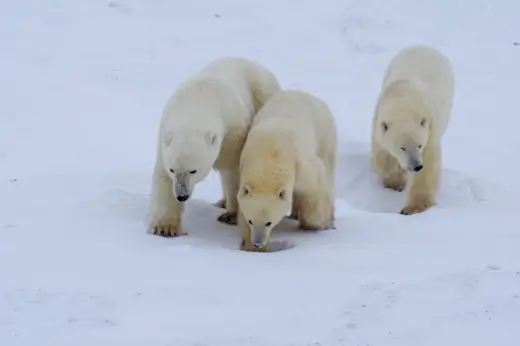
“In the dead of winter last year, the [grocery store] didn’t get their shipment in. So, there was nothing on the shelves,” says Jayden Chapman, sustainability coordinator at the Churchill Northern Studies Centre (CNSC), a non-profit organization that facilitates research and education initiatives in the North.
It was a reminder of the food security crisis in 2017 when a devastating flood event washed out the train tracks and cut off the flow of food and essential goods into the community. All essential goods had to be flown in,’ and, as a result, food prices skyrocketed and quality plummeted.
“We’d get a shipment in and it would already be black and moldy. They’d still put it on the shelf because it was our only option,” says Chapman.
In the face of crisis, staff at the CNSC decided to innovate, and through a collaboration with Growcer Modular Food Solutions, they piloted one of the first vertical, hydroponic farm projects—housed in a 40-foot shipping container built to withstand the harsh winter conditions that can dip below -40 Fahrenheit—in northern Canada. The pilot project was a success and, as a result, the Rocket Greens initiative was born.
Today, Chapman and her colleagues produce between 250 and 400 units of fresh greens, which they deliver via a weekly subscription program to residents, restaurants and businesses.
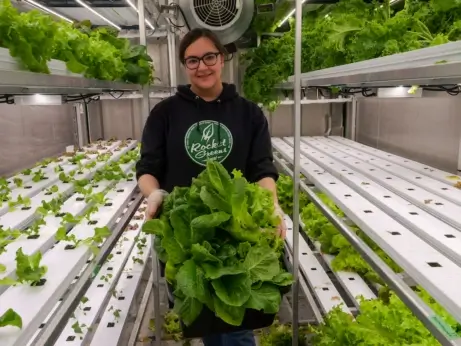
Katherine Branson, a sustainability technician at CNSC, manages the weekly production, planting seeds and transplanting seedlings after two weeks. Most plants take five to six weeks to grow to maturity, she says. Branson plants a variety of leafy greens and herbs—40 varieties in total—often opting for leafy kale, which tends to thrive. The plants are irrigated by a 1,200-liter tank, which circulates water continuously and is topped up every three weeks.
“I try to grow to full capacity every week, no matter how many people are buying because we like to donate the surplus,” explains Branson. “This is really important to us. We can’t really address food security and sovereignty if we’re just selling to the people who can afford it. We donate it so people who don’t have the means can access it.”
Another critical issue facing the town of Churchill is organic waste management, says Chapman, particularly related to scents attracting polar bears and increasing the risk of human-bear conflict. During the summer and fall months, as bears wait for the bay to freeze, they often follow their noses into town or to the garbage dump. Increasingly warming temperatures, due to climate change, is resulting in delayed freeze-up and bears spending more days on land.
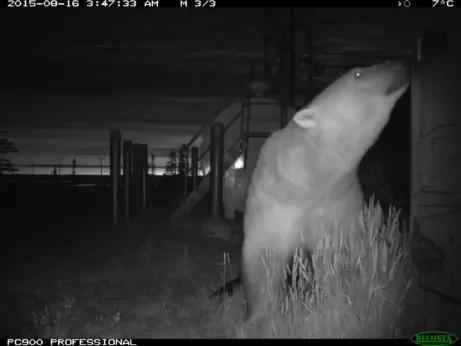
Dr. Doug Clark, a researcher at the University of Saskatchewan, uses trail cameras to study the relationship between the increasing number of days that bears spend on land and the frequency of visitation to human facilities, including the CNSC. In warmer years, like 2023, Clark is seeing a correlation between delayed sea ice and increased visitation of bears to human structures, including waste bins.
“This [research] tells us that we should focus our efforts on better managing waste and other attractants to prevent human-bear interactions,” says Clark. “And when they do occur to prevent escalation.”
This winter, Chapman and her colleagues are excited to launch a new initiative at the CNSC and pilot an in-vessel, outdoor composter to transform kitchen waste into compost.
During the summer and fall months, when dozens of researchers and guests come to stay at the CNSC, the facility produces upwards of five gallons of organic waste a day. In the current system, the waste is stored behind the building, and although bears can’t get into it, the scent still attracts them, as documented by Clark’s research.
“This will help to reduce the smell of garbage around the Centre and the tension and risk of bumping into a polar bear,” says Chapman.
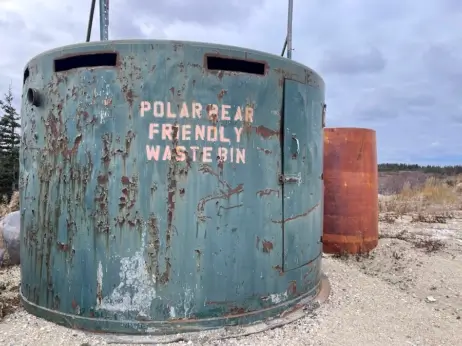
The BIOvator, a stainless steel incinerator, breaks down organic and carbon materials, including a combination of kitchen waste and cardboard, or wood shavings, and converts the waste into nutrient-rich soil.
“We’re basically creating a product out of garbage,” says Chapman.
As part of the pilot project, the center will collect kitchen waste from the facility, staff’s kitchen waste from their own households and local restaurants in town. But Chapman hopes to expand their reach further into the community, which would, in turn, divert food waste from the landfill. The soil will be distributed to a community garden project in Churchill.
Chapman’s team’s efforts are part of a wider trend to implement improved waste management strategies in Churchill to reduce the number of bears wandering into town. For example, the town of Churchill is currently considering switching from an interior dump, which houses waste for several years before being shipped south to a landfill, to a thermal incinerator, which is a more environmentally safe method.
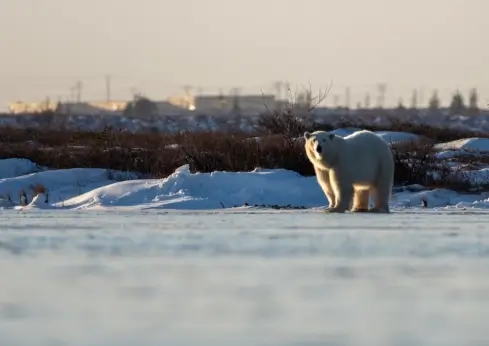
With the looming threats of climate change, northern communities around the Hudson Bay will continue to face challenges with melting sea ice and the increased presence of polar bears in the community. But Churchill is leading the way as a model community in the Arctic for food security initiatives.
Other remote northern towns are following in Churchill’s footsteps. In 2018, Kuujjuaq, Nunavik, an Inuit community in northern Quebec, invested in a hydroponic farm in a shipping container. The following year, a vertical farm was established by a local grocery store in Yellowknife, Northwest Territories to supply people with fresh produce. The Gitmaxmak’ay Nisga’a Society, a non-profit First Nations organization based in Prince Rupert, British Columbia, invested in a similar model in 2020, and today feeds 1,600 members on a weekly basis.
“Over the years, we’ve spent a lot of time updating and troubleshooting the hydroponic farm,” says Branson. “But we’ve been producing healthy greens in Churchill for six years now.”
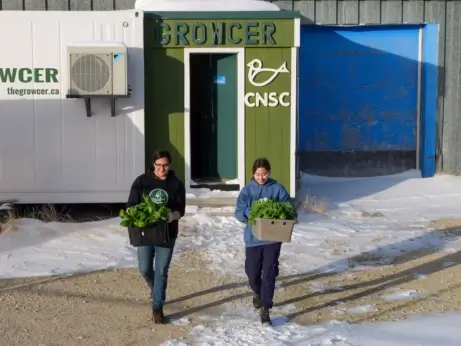
Since they started, the Rocket Greens initiative has sold more than 40,000 units of produce and the price of leafy greens (around $7 with government subsidies) has dropped to $4.
“It’s pretty amazing,” says Branson, as she places heads of lettuce into the weekly boxes.
Before she leaves the research station, she does as locals do in Churchill: looks both ways for bears. With none in sight, Branson steps out into the frigid sub-arctic temperatures to deliver fresh greens right onto people’s front doorsteps.
Follow us

This work is licensed under a Creative Commons Attribution-NoDerivatives 4.0 International License.
Want to republish a Modern Farmer story?
We are happy for Modern Farmer stories to be shared, and encourage you to republish our articles for your audience. When doing so, we ask that you follow these guidelines:
Please credit us and our writers
For the author byline, please use “Author Name, Modern Farmer.” At the top of our stories, if on the web, please include this text and link: “This story was originally published by Modern Farmer.”
Please make sure to include a link back to either our home page or the article URL.
At the bottom of the story, please include the following text:
“Modern Farmer is a nonprofit initiative dedicated to raising awareness and catalyzing action at the intersection of food, agriculture, and society. Read more at <link>Modern Farmer</link>.”
Use our widget
We’d like to be able to track our stories, so we ask that if you republish our content, you do so using our widget (located on the left hand side of the article). The HTML code has a built-in tracker that tells us the data and domain where the story was published, as well as view counts.
Check the image requirements
It’s your responsibility to confirm you're licensed to republish images in our articles. Some images, such as those from commercial providers, don't allow their images to be republished without permission or payment. Copyright terms are generally listed in the image caption and attribution. You are welcome to omit our images or substitute with your own. Charts and interactive graphics follow the same rules.
Don’t change too much. Or, ask us first.
Articles must be republished in their entirety. It’s okay to change references to time (“today” to “yesterday”) or location (“Iowa City, IA” to “here”). But please keep everything else the same.
If you feel strongly that a more material edit needs to be made, get in touch with us at [email protected]. We’re happy to discuss it with the original author, but we must have prior approval for changes before publication.
Special cases
Extracts. You may run the first few lines or paragraphs of the article and then say: “Read the full article at Modern Farmer” with a link back to the original article.
Quotes. You may quote authors provided you include a link back to the article URL.
Translations. These require writer approval. To inquire about translation of a Modern Farmer article, contact us at [email protected]
Signed consent / copyright release forms. These are not required, provided you are following these guidelines.
Print. Articles can be republished in print under these same rules, with the exception that you do not need to include the links.
Tag us
When sharing the story on social media, please tag us using the following: - Twitter (@ModFarm) - Facebook (@ModernFarmerMedia) - Instagram (@modfarm)
Use our content respectfully
Modern Farmer is a nonprofit and as such we share our content for free and in good faith in order to reach new audiences. Respectfully,
No selling ads against our stories. It’s okay to put our stories on pages with ads.
Don’t republish our material wholesale, or automatically; you need to select stories to be republished individually.
You have no rights to sell, license, syndicate, or otherwise represent yourself as the authorized owner of our material to any third parties. This means that you cannot actively publish or submit our work for syndication to third party platforms or apps like Apple News or Google News. We understand that publishers cannot fully control when certain third parties automatically summarize or crawl content from publishers’ own sites.
Keep in touch
We want to hear from you if you love Modern Farmer content, have a collaboration idea, or anything else to share. As a nonprofit outlet, we work in service of our community and are always open to comments, feedback, and ideas. Contact us at [email protected].by Trina Moyles, Modern Farmer
January 17, 2024
Modern Farmer Weekly
Solutions Hub
Innovations, ideas and inspiration. Actionable solutions for a resilient food system.
ExploreExplore other topics
Share With Us
We want to hear from Modern Farmer readers who have thoughtful commentary, actionable solutions, or helpful ideas to share.
SubmitNecessary cookies are absolutely essential for the website to function properly. This category only includes cookies that ensures basic functionalities and security features of the website. These cookies do not store any personal information.
Any cookies that may not be particularly necessary for the website to function and are used specifically to collect user personal data via analytics, ads, other embedded contents are termed as non-necessary cookies.
With the benefit of global warming the community may soon be able to grow their crops outdoors for part of the year.
What an ingenious project! Congratulations. I had the pleasure of dining on some rocket greens this past fall. They were delicious.